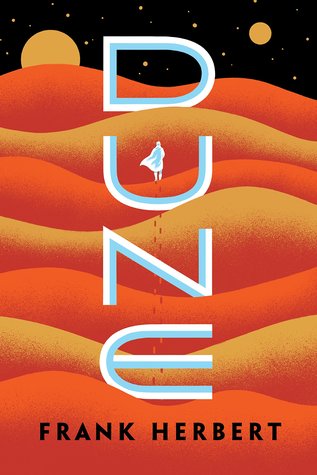Dune. Frank Herbert. 1965. 687 pages. [Source: Library]
First sentence: In the week before their departure to Arrakis, when all the final scurrying about had reached a nearly unbearable frenzy, an old crone came to visit the mother of the boy, Paul.
Premise/plot: Dune is a science fiction classic originally published in 1965. At the center of this one is a young man, Paul Atreides. His father is Duke Leto; his mother is Jessica, a Bene Gesserit. Is Paul the one? Will he fulfill ancient prophecy? Perhaps. Perhaps. All in good time. The novel opens with the family preparing to move planets. Duke Leto has been given the desert planet, Arrakis, aka "Dune." But though this is technically a "gift"--one that he couldn't refuse--it's more of a gift horse. It doesn't take a genius to figure out that once the family arrives their lives will become even more endangered. The powers that be--multiple powers--have decided that Duke Leto should die; all the pieces--the pawns--are in place. It's just a matter of time before the House of Atreides is wiped out completely. His father's fate seems set in stone, however, there is hope for the boy and his mother. If there wasn't hope then this would be a much, much shorter novel. Most of the action occurs AFTER the murder of the Duke as Paul and Jessica flee for their lives and take refuge with the planet natives, the Fremen. Their safety among the natives depend on Paul fulfilling ancient prophecy.
As Paul matures his supernatural abilities deepen. One of his powers seems to be seeing all the possibilities of the future at once. He sees how every decision influences those futures: new futures open up; others disappear. Will Paul be wise enough to use his power for good? What does he have in mind for his followers? his planet? the galaxy?
My thoughts: I have given up on Dune several times in the past. My first introduction to the story was through a miniseries. So I had a vague-fuzzy recollection of what Dune was about. But I was DETERMINED to get through this classic this time: no excuses allowed. I "forced" myself to read in Dune at least four or five times a week. And indeed this seemed to make a big difference. Even if I was just moving that bookmark two or three chapters a day, slowly but surely progress was being made on this intimidating book.
The plot basics of the story weren't all that bad, all that intimidating.The writing, however, was. Intentionally so, I believe. The narrative is awkward: strange names, strange words, strange cultures, but above all else strange sentence construction. For example, "She felt that she was a conscious mote, smaller than any subatomic particle, yet capable of motion and of sensing her surroundings. Like an abrupt revelation--the curtains whipped away--she realized she had become aware of a psychokinesthetic extension of herself. She was the mote, yet not the mote...She focused on the psychokinesthetic extension of herself, looking within, and was confronted immediately with a cellular core, a pit of blackness from which she recoiled..." I believe this is intention other-worldliness, aka WORLD BUILDING.
Did I enjoy this one? A little bit. It was tough going, for the most part, but the last hundred pages or so were action-packed. All the not-so-subtle hinting came to fruition. I don't know that I'll ever feel compelled to read the rest of the series.
© 2019 Becky Laney of Becky's Book Reviews


No comments:
Post a Comment